Raisi Says Iran To Barter Petrochemicals For Food With Africa
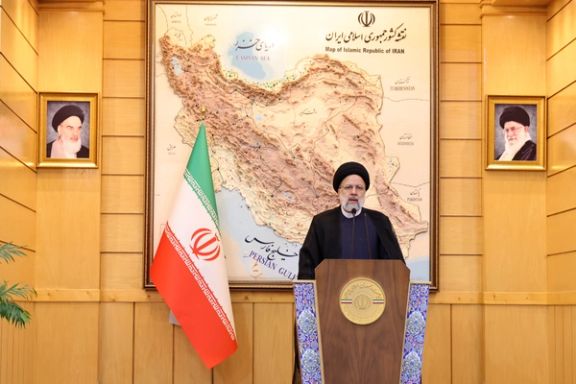
Iran will barter petrochemical products with African countries in exchange for food, President Ebrahim Raisi was quoted as saying after a tour of three countries.

Iran will barter petrochemical products with African countries in exchange for food, President Ebrahim Raisi was quoted as saying after a tour of three countries.
Raisi, who visited Kenya, Zimbabwe and Uganda this week returned to Tehran on Friday and said the first aim of his African tour was to expand “Iran’s strategic depth” on the continent.
Isolated by US and European sanctions, the Islamic Republic has few options to develop economic relations to relieve economic pressure, which has led to very high inflation estimated to range from 70-100 percent. Raisi himself faces sanctions and cannot travel to Western countries.
The official government news website IRNA quoted Raisi as saying that securing “raw materials” and food was the second goal of his trip. He maintained that there is good opportunity for agriculture in Africa and Iran could trade petrochemical products and receive much needed food staples.
All three countries the Iranian president visited are grappling with numerous economic and social crises. Neither Iran nor these African countries have much to offer to each other in trade. However, Raisi said that the Islamic Republic has common ground with the three African countries in opposing “unilateralism”, a reference to Western diplomatic and economic power.
Upon his return to Tehran the president claimed that because of the Islamic revolution Iran has succeeded in establishing wide-ranging ties with many countries around the world. In fact, Iran enjoyed a respected status before the revolution and its citizens had the opportunity of visa-free travel to most countries in the 1970s.
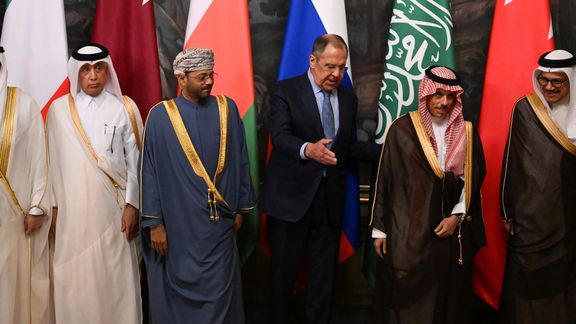
Iranian media continued criticizing Russia for questioning Iran's ownership of three small islands in the Persian Gulf contested by the United Arab Emirates.
Iranian media and social media users were deeply annoyed when Russia joined the Persian Gulf Arab states earlier this week to demand a settlement to the dispute over the ownership of the islands Iran says are its integral part.
The Foreign Ministry summoned Russia's ambassador and Foreign Minister Hossein Amir Abdolahian and government spokesman Ali Bahadori wrote in separate tweets that "Iran will not compromise over its national interests and territorial integrity."
However, Tehran’s official reaction to Russia has been meek. Social media users said officials had indeed made a compromise by not naming Russia in their tweets.
Britain, which maintained control of Abu Musa, and the Greater and Lesser Tunb it had occupied in the 19th century, withdrew its forces from the Persian Gulf in 1971 and the United Arab Emirates was formed. However, Iran’s Imperial government at the time decided to reclaim what it believed were historical Iranian islands.
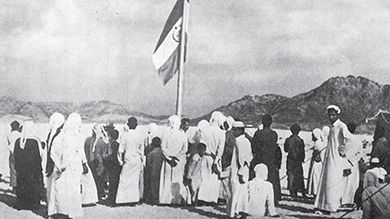
Mohammad Reza Shah sent the Iranian navy to secure all three in November of the same year, two days before UAE was established. Iranian forces remain on the islands, with only Abu Musa having much of a civilian population of several thousand.
In its Thursday edition, conservative newspaper Jomhouri Eslami wrote in a strongly worded editorial: "This is not going to be Russia's last treason against Iran." The daily added: "Foreign Ministry officials should not think that this episode will end by summoning Russia's ambassador. We need an essential revision of our political relations with Russia and forcing Russian statesmen to regret their treason against the Iranian nation."
The daily wrote, Russia's diplomatic move once again proved that those who opposed staunch supporters of Russia in the Iranian government were right.
The daily added that Russia and China are always prepared to undermine all international regulations and ethical rules to serve their own interests.
Asked why Moscow undermined Iran's territorial integrity," international relations analyst Mehdi Motaharnia told Khabar Online that "Russia wishes to put an end to its isolation by sacrificing Iran's interests." Meanwhile, he called Iranian officials' mild reaction "a withdrawal from revolutionary positions."
Meanwhile, Motaharinia said that "Iran's stance on the issue was one of the weakest since the 1979 revolution." He added that Russia's stance about referring the case to the International Court of Justice was tantamount to recognizing the United Arab Emirates' claims about the ownership of the three islands.
This comes, he said, while Iran has always looked at Russia as its strategic partner and has even helped Russia in its war against Ukraine, but Russia has never done anything to prove it is Tehran's strategic partner. On the contrary, he said "Russia's stance was against Iran's territorial integrity."
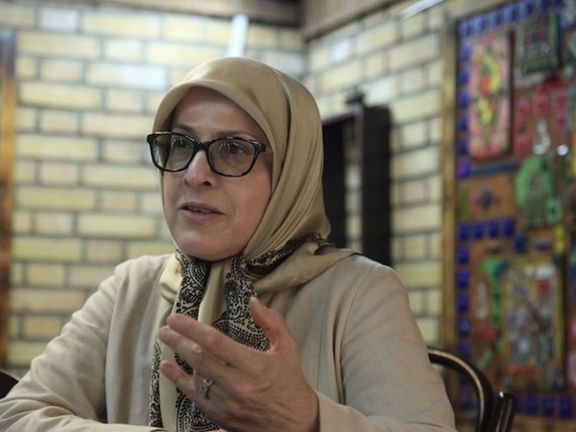
Also, reformist politician Elaheh Koulaei told Etemad Online website: "Russians will never consider Iran's interests in their relations with Iran or any other country." She stated that assuming Russia cares for Iran's interests is totally contradict the realities of international relations.
She echoed other public figures who have said that Iran’s pro-Moscow and pro-Beijing foreign policy has led to an imbalance, without Tehran considering geopolitical facts and Iran's geostrategic requirements. Koulaei added that Teharan’s pro-East foreign policy ignores the need for a balance between relations with East and West. Such a policy cannot serve Iran's national interests.
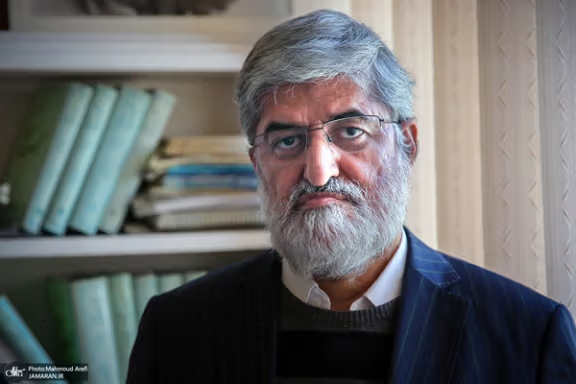
Meanwhile, former lawmaker Ali Motahari wrote in a tweet: "Russia understands that Iran has been isolated because of its radical anti-Western policies and it needs Russia's support."
Motahari added: "Russia's behavior was in fact another warning to Iran and its pro-Russian politicians to stop their pro-Eastern policies and revert to the idea of "neither East nor West" that was its foreign policy motto after the 1979 revolution."
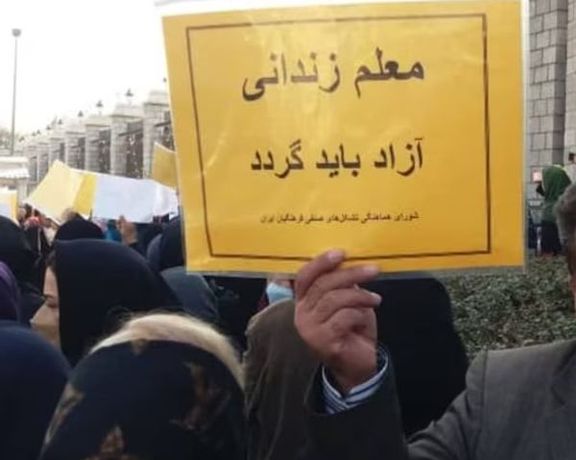
Iranian teachers have launched a campaign to collect 100,000 signatures calling for the release of detained educators and end to their harassment.
Esmail Abdi, a teachers’ union leader who has been in prison since 2015 backed the initiative by sending a message from jail. He said that the extent of repression against teachers has expanded in recent years.
Abdi who was the leader of Tehran Teachers’ Association was sentenced to a six-year term in 2016 but is still in prison.
A current campaign has already collected 10,000 signatures, but teachers’ union members, some in exile, have called for collecting one hundred thousand.
Last week, 1,200 teachers sent a letter to the heads of the three branches of government asking them to release detained union activists and end harassment by security forces and the Judiciary that continues to fabricate legal cases against union members. However, the president and the head of the judiciary refused to accept the letter.
Teachers say that in most likelihood, top state officials think 10,000 signatures represents just one percent of the one million teachers in the country. This is the reason the activists have embarked on collecting 100,000 signatures.
Teachers maintain that they have pursued their demands through peaceful and legal means for two decades, but the Islamic Republic has always dealt with them through force and intimidation.
Teachers have been demanding higher wages and pensions for years, as one of the lowest paid class of government employees. In 2010s, government appointed officials embezzled hundreds of millions of dollars from their pension fund, without any serious consequences.
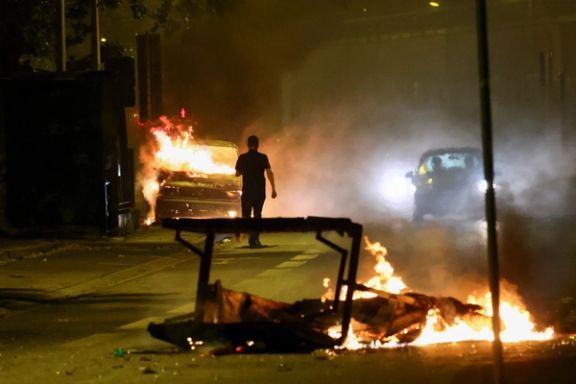
The French secretary of state for Europe, Laurence Boone, said several countries cynically instrumentalized France's recent riots, including Iran, Turkey and Azerbaijan.
“We must absolutely not be fooled by the cynicism and bad intentions of certain countries, which never hesitate in the face of instrumentalization or disinformation”, added Boone during a Senate speech on Wednesday.
“In some countries, the images of the events are used for the benefit of the propaganda of the regimes and we have systematically responded to these malevolence, in particular to the Azerbaijani, Turkish or Iranian remarks”, she continued.
In early July, Iran’s foreign ministy spokesman Nasser Kanaani called on the French government and police "to take into account the demands of the protesters while exercising restraint and avoiding violence.”
In response, the spokesperson of the French Foreign Ministry slammed Iran's record of killing and blinding protesters.
Referring to the protests which erupted in France following the death in police hands of a young Muslim, Anne-Claire Legendre said: “We understand your concern for human rights and the lives of French citizens ... and for this reason, we will not kill anyone with a weapon of war, nor will we shoot an eye to blind it!”
Legendre was referring to the killing of hundreds of protesters by the Iranian regime in the months following the death in custody of Mahsa Amini in September. The Islamic Republic security forces also systematically targeted protesters’ eyes.
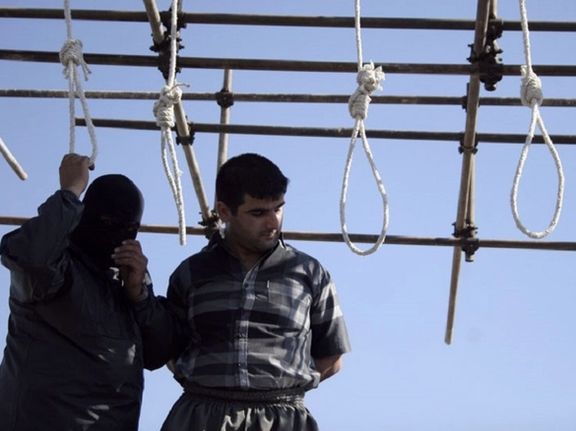
Iranian media reported that two other men were publicly hanged in Fouladshahr, Esfahan province, on charges of moharebeh (enmity against God) and corruption on earth on Wednesday.
According to the Judiciary's Mizan website, the two men identified as Mohammad Ghaedi Nasab, 35, and Sadegh Mahmoudi Baram, 25, were publicly hanged after a criminal court sentenced them to death for participation in murder.
It is alleged that the two defendants fought and disarmed officers, killing one and causing another to lose a finger on November 18, 2021.
The executions bring this week's total of public hangings to four.
On Saturday, Iran hanged two Afghan men in public on charges of playing a role in an attack on a shrine in October 2022 where 15 people died and 20 were wounded.
Mohammad Ramez Rashidi and Naeem Hashem Ghetali were hanged in a street near the Shahcheragh Shiite shrine and mausoleum in the southern city of Shiraz early in the morning. Iran's official news agency IRNA said they were hanged before dawn with “hundreds of the families of the martyrs” and other citizens of Shiraz witnessing the executions.
The attack on Shahcheragh shrine took place October 26 last year when anti-regime protests were raging on in Iran. This led to speculations and accusations that the attack was staged by the government to divert attention from the protests and also justify a crackdown.
Meanwhile, death sentences of at least three other citizens with charges like drug trafficking and murder were in Jiroft, Kerman province.
Earlier, the US-based Human Rights Activists News Agency (HRANA) mentioned in its annual report that in the previous Iranian year ending on March 20, at least 617 citizens were executed, two of them in public.
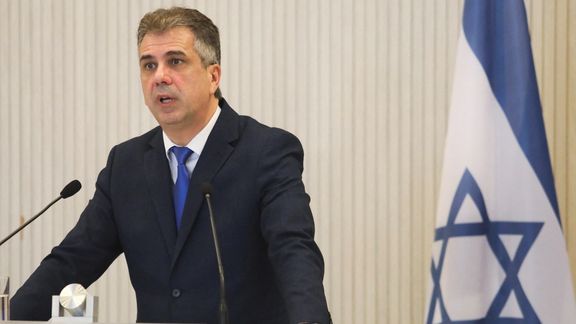
Israel has claimed that Iran was behind a foiled attack on its embassy in Azerbaijan, the latest in a wave of regime’s plots against Israeli targets abroad.
Foreign Minister Eli Cohen described the Iranian regime as a “global terror threat” Thursday, adding that Tehran is orchestrating a series of attempts to harm Israelis abroad. “Tehran stands behind the attempt,” Cohen said in a statement during an official visit to Serbia.
He made the remarks two days after Azerbaijan's security agencies said they thwarted a terrorist attack on the Israeli embassy in the capital Baku, arresting a 23-year-old Afghan national identified as Fawzan Mosa Khan.
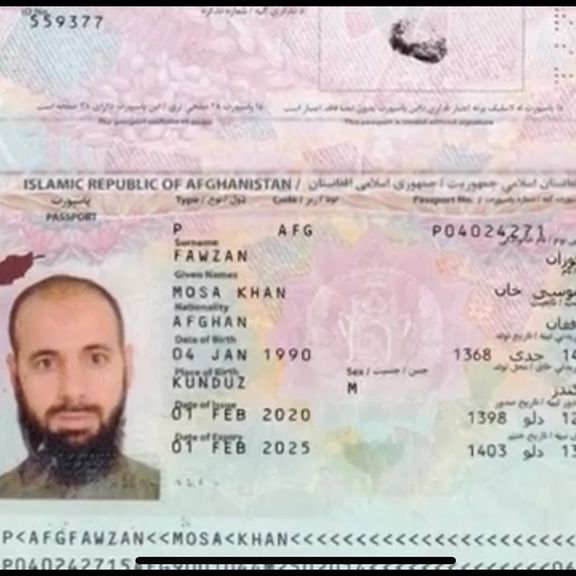
“Iranian terror is a global threat, as we saw in the past few days in Azerbaijan in an attempted attack against the Israeli Embassy in Baku, as well as in recent months in Cyprus and Greece in attempted attacks against Israelis and Jews,” Cohen said, adding Iran had funded and issued instructions to the terror cell that attempted the attack.
He also reiterated calls on the international community to come together to oppose the Islamic Republic’s terror activities.
During a visit to Azerbaijan on Thursday, Gallant said Israel and its foreign partners have foiled more than 50 Iranian-orchestrated attacks on Israelis and Jews abroad in recent years.
"At its supreme leader's orders, Iran has in recent years waged a worldwide terror campaign of unprecedented scale, focused on Israelis and Jews ... We are talking about more than 50 attempted attacks," Israeli media quoted him as saying.
According to Azerbaijan’s State Security Service, Mosa Khan was planning to commit a terrorist act accompanied by an explosion, fire or other similar events in conspiracy involving other individuals. It added that he came from “a foreign country” in order to surveil “a third country embassy,” recruit a cell and obtain weapons and funding.
Israel's intelligence agency, Mossad, recently revealed new details about a terrorist cell directed by Iran which intended to harm Israeli businessmen in Cyprus after Cypriot intelligence services revealed they had foiled the Iranian plot.
Israel later said its agents in Iran succeeded in capturing the suspect behind the IRGC-planned attack on its nationals.
The Mossad published a video of the captured agent, identified as Yousef Shahabazi Abbasalilo, sharing details of his entry to Cyprus through the Turkish occupied north and how he had scoped out the location of the first target for assassination, prepared the weapon and concealed it on word that he must flee just days ago. Iran rejected the veracity of the video.
In March, Greek police arrested two Pakistani nationals who were allegedly planning mass-casualty terrorist attacks against a Jewish restaurant and Chabad House in Athens.
In November of last year, Georgian security officials revealed they had foiled a recent attempt by the extraterritorial arm of Iran’s Revolutionary Guards, the Quds Force, to kill a prominent Israeli-Georgian living in the capital Tbilisi.
The latest plot comes amidst simmering tensions between Iran and its archrival Israel, and with its neighbor, Azerbaijan.
Tensions which have been rising between Iran and Azerbaijan since November 2022 when both sides accused each other of engaging in terrorism and espionage in the other’s territory. Things worsened with the opening of the Azerbaijan embassy in Tel Aviv, which angered Tehran. Iran has conducted military drills on Azerbaijan's border as a show of force.
In June, Baku closed the Islamic Republic’s cultural attaché office in the city, about a week after an opposition group released documents obtained from a hack into the Iranian presidency servers, showing that the Iranian government is eying ways to redefine its relations with Azerbaijan.
Iran has suggested Azerbaijani involvement in the October 26 attack in Shiraz claimed by the Islamic State group (Isis-Daesh) and, also accuses Baku of harboring Israeli intelligence and military elements that plan to use its territory in a possible attack against Iran’s nuclear facilities.
The two countries in early May expelled each other’s diplomats after incidents that Baku also dubbed as "terrorist attacks". These included a gunman’s attack on Azerbaijani diplomatic mission in Tehran in January after which Baku shut down the embassy and an attack on Azerbaijani lawmaker Fazil Mustafa in March, who is an outspoken critic of the Islamic Republic.